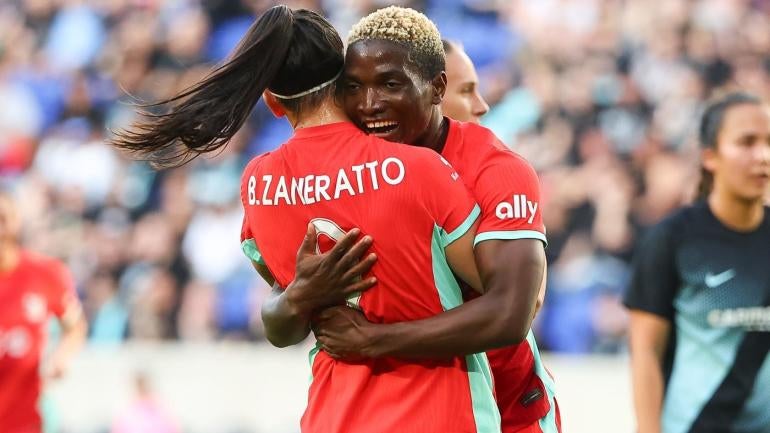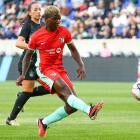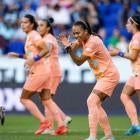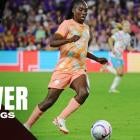
By the time the final whistle blew at Red Bull Arena on Sunday marking the end of the last NWSL quarterfinal, the most unsurprising semifinal bracket was set. The top four teams in the regular season – Orlando Pride, Washington Spirit, NJ/NY Gotham FC and Kansas City Current – were now the last four teams standing, clearly demonstrating their dominance over the rest of the league this year.
Their postseason success mirrors their regular season showing, in which they created a 16-point gap between themselves and the rest of the league. It's a remarkable turnaround from last season when only 13 points separated first and last place, as well as a big milestone for the teams in question. Only the Current made the playoffs in 2022, while only Gotham took part in the postseason in 2023, emerging as surprise champions as the lowest-seeded team in the running.
The top four's ability to transform over a short period of time is another example of the NWSL's potentially unmatched parity, which has been the league's greatest competitive selling point for years. Dynasties are somewhat rare in this league, though some have come close – the Portland Thorns have qualified for the postseason in all but one season and are the NWSL's most successful team with three championships. The now-defunct FC Kansas City, meanwhile, won back-to-back titles in 2014 and 2015, while the North Carolina Courage did the same in 2018 and 2019.
That pattern indicates that as hard as it is to win titles in a given year in the NWSL, staying at the top season after season might be even more difficult. It forces the question: How long can this season's top four stay there, and what will it take for the rest of the league to break up the party as soon as next season?
Here's a look at why this season's top four rose to the occasion, and why the NWSL is still well-positioned to deliver some twists and turns for the foreseeable future.
History doesn't matter
Though this season's top four includes two previous NWSL champions, they are not necessarily amongst the league's most successful sides. That's especially true for the Pride and Gotham, who were historically amongst the league's bottom-dwellers, while the Current only began play in 2021 but have been overshadowed by other expansion teams at times in the past. None of this was a particular hindrance as they started building their current rosters, in large part because they have been willing to evolve with the NWSL as a whole.
The league is in the midst of a rapid period of professionalization fueled by increased investment, which has transformed the way teams can construct rosters. Salaries are on the rise and international spots are more readily available, while clubs have splurged on everything from high-profile coaches, scouting departments, high-performance staff, training environments and even facilities. It makes many, if not all, NWSL teams a coveted destination in an evolving women's soccer landscape.
"I think that there's a real interest in moving to the NWSL for a lot of international athletes and for good reason, right?," Orlando Pride sporting director Haley Carter told CBS Sports. "The pay is fantastic. It's better, on the whole than any other league in the world. It's the best in the world so when you look top to bottom of a roster, the average salary here is significantly higher here than it is anywhere else."
Each of the top four teams, as a result, was able to sign some of the league's most exciting players in the offseason. MVP contenders Barbra Banda and Temwa Chawinga joined the Pride and the Current, respectively, during the winter, while Gotham impressively landed four U.S. women's national team players through free agency. The Spirit also dipped into the international market to sign Colombia's Leicy Santos and also acquired Rookie of the Year frontrunner Croix Bethune in the draft.
NWSL's tactical evolution
The NWSL is not just a strong financial option for players – the on-field play is becoming increasingly alluring. The league has long been classified as a physical league while its European counterparts are considered more technically advanced, but an influx of international players and coaches has changed the NWSL's tactical profile. Gotham and the Spirit are two such examples – the former boast reigning coach of the year Juan Carlos Amoros, while the latter welcomed two-time UEFA Women's Champions League winner Jonatan Girladez over the summer.
Both Amoros and Giraldez hail from Spain, which has re-emerged as a soccer superpower in recent years with last year's win at the Women's World Cup and the men's team's triumph at last summer's Euros. Their résumés, as well as the recent successes of Spanish soccer, make their teams a more compelling destination for prospective talent and sharpen the skills of other coaches around the league, who have their own impressive tactical approaches. Additionally, the NWSL's wide-ranging investment injection makes the league an equally attractive destination for top-tier coaches as it does players.
"I am happy that coaches are successful here, wherever they are, or players because I think we have a fantastic culture. We have a fantastic way of playing," Amoros said after Gotahm's win over the Portland Thorns on Sunday. "Hopefully there [are] more people having success because in Spain, as you know, sometimes the conditions in the women's game or in lower categories in terms of the coaching, [there] is a lot of sacrifice, people doing a lot of effort for not a lot of money … It's really difficult."
Smart rebuilds
Ultimately, the top four rose to the top of the standings because they successfully navigated a rebuilding period. Their needs were different and so were their stumbling blocks, but the combination of player recruitment, coaching hires and front office selections allowed these clubs to create championship-contending rosters in a new era of squad building for the NWSL. The big question, though, is if they can keep things going for another few years.
In a league where few teams have a major financial advantage over the others, it is entirely possible that any of the other 10 teams undergo a rebuild of their own in the upcoming offseason. Some will be better positioned than others, of course. The Thorns are already in the process of recruiting younger players after relying on veteran players in the recent past, while Bay FC can chalk some of their expansion season struggles to individual errors at the back and underperforming on their expected goals tally, both fixable problems. On the flip side, the San Diego Wave probably have a big rethink ahead of them after a season that did not get better following the sudden firing of Casey Stoney, and the same goes for the Seattle Reign after losing some key players in the winter.
Player recruitment will take a fascinating new turn this offseason, the first since the NWSL eliminated its college draft through a new collective bargaining agreement. College athletes are essentially free agents now, increasing the competition amongst the league's teams to land the top talent. The Wave already got started by signing Texas' Trinity Byers, the team's all-time leading goalscorer who could help the 2023 NWSL Shield winners after a goal-shy season.
How quickly they pull off their own rebuilds is an obvious question, as is one facing this year's top four. Players, coaches and front office staff at each of the semifinal-bound teams will argue there's still work to do, both en route to the championship game and ahead of next season. They will need to identify their areas of improvement wisely. Gotham, for example, rely on a lot of players in their peak playing years, while the Current are in the process of shoring up their defense.
In the end, the changing calculus behind squad building in the NWSL reflects the league's historic parity. The teams that cracked the code first rose straight to the top, but the learning curve only lasts so long for ambitious sides in the NWSL. If the last year is anything to go by, another competitive offseason is likely on the horizon.
















